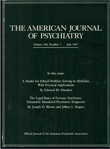Withdrawal responses to abrupt discontinuation of desmethyldiazepam
Abstract
The authors present the results of a controlled observation of withdrawal reactions accompanying cessation of desmethyldiazepam (clorazepate) therapy. The two subjects studied had had generalized anxiety disorder for several years; both were free from manifestations of other forms of psychopathology or addictive behavior patterns. Both patients maintained stable patterns of clorazepate use at modest doses for extended periods of time. The findings suggest that the long plasma half-life of clorazepate does not offer unique protection from withdrawal reactions associated with long-term therapy. Manifestations of these withdrawal reactions are indistinguishable from reactions associated with other benzodiazepine compounds.
Access content
To read the fulltext, please use one of the options below to sign in or purchase access.- Personal login
- Institutional Login
- Sign in via OpenAthens
- Register for access
-
Please login/register if you wish to pair your device and check access availability.
Not a subscriber?
PsychiatryOnline subscription options offer access to the DSM-5 library, books, journals, CME, and patient resources. This all-in-one virtual library provides psychiatrists and mental health professionals with key resources for diagnosis, treatment, research, and professional development.
Need more help? PsychiatryOnline Customer Service may be reached by emailing [email protected] or by calling 800-368-5777 (in the U.S.) or 703-907-7322 (outside the U.S.).



